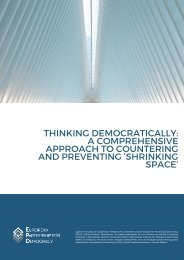Repression and resilience: Diagnosing closing space mid-pandemic
Create successful ePaper yourself
Turn your PDF publications into a flip-book with our unique Google optimized e-Paper software.
4 REPRESSION AND RESILIENCE: DIAGNOSING CLOSING SPACE MID-PANDEMIC<br />
Executive summary<br />
The past decade has been challenging for democracy worldwide, with experts pointing to a trend of ‘democratic<br />
backsliding’ or ‘autocratisation’ characterised by continued attacks on democratic <strong>space</strong>. The COVID-19 p<strong>and</strong>emic<br />
has further complicated the picture. The contagiousness <strong>and</strong> deadliness of the virus forced authorities to implement<br />
drastic measures in order to avert more deaths. Temporary limitations to the exercise of fundamental freedoms <strong>and</strong><br />
democratic practices have thus been justified by overriding public health concerns. Yet, the crisis has also forced<br />
governments to tread a thin line between admissible health measures <strong>and</strong> the blatant abuse of emergency powers, to<br />
the detriment of democratic <strong>space</strong>.<br />
This study illustrates how democratic <strong>space</strong> was affected by the global p<strong>and</strong>emic, drawing on case studies from<br />
Burundi, Colombia, El Salvador, Guatemala, Honduras, Indonesia, Kenya, Ug<strong>and</strong>a <strong>and</strong> Venezuela, as well as the wider<br />
research community. The research points to the important role of country-specific political developments <strong>and</strong> other<br />
concurring crises in defining the impact of the global p<strong>and</strong>emic on each country’s democratic <strong>space</strong>. Across case<br />
studies <strong>and</strong> other literature, we find that the p<strong>and</strong>emic has aggravated <strong>and</strong> accelerated existing trends of democratic<br />
backsliding. Authorities have been hiding behind p<strong>and</strong>emic management to further clamp down on civic <strong>space</strong>, create<br />
an uneven level playing field, <strong>and</strong> undermine the system of democratic checks <strong>and</strong> balances.<br />
Trends in democratic <strong>space</strong> a<strong>mid</strong> a global p<strong>and</strong>emic<br />
The study also identifies several new trends in democratic <strong>space</strong> during the past year. 2020 saw a major increase<br />
in violent attacks on human rights defenders, political activists, civil society staff <strong>and</strong> media workers, at a time when<br />
freedom of assembly <strong>and</strong> speech were curtailed to curb the spread of the virus. The increased role of the military<br />
in leading the p<strong>and</strong>emic response <strong>and</strong> ensuring compliance with lockdown measures translated into an increase of<br />
excessive <strong>and</strong> arbitrary use of force by military <strong>and</strong> police officials.<br />
Alongside that, states of emergency empowered executives to operate with limited or no oversight from parliaments,<br />
judicial bodies, <strong>and</strong> other watchdog institutions, further aggravated by the latter’s slow adaptation to remote settings.<br />
The lack of oversight came with a surge in corruption in the procurement of medical supplies, a widespread mish<strong>and</strong>ling<br />
of p<strong>and</strong>emic funds, <strong>and</strong> the quick passing of legislation unrelated to the p<strong>and</strong>emic without oversight. Some judiciaries<br />
strongly protected fundamental freedoms <strong>and</strong> countered disproportionate lockdown measures, while some opposition<br />
parties saw themselves disadvantaged by online parliamentary proceedings.<br />
The p<strong>and</strong>emic has also exacerbated intersecting inequalities <strong>and</strong> systemic discrimination faced by women <strong>and</strong><br />
marginalised communities, who saw a deterioration in their livelihoods <strong>and</strong> opportunities for political inclusion, as<br />
well as an increase in violence. Whilst the deepening of inequalities is in many cases not the result of a proactive<br />
attack on democratic <strong>space</strong>, it will have long-lasting effects on women <strong>and</strong> vulnerable groups’ representation <strong>and</strong><br />
opportunities for participation. Further undermining participation, many elections were postponed or took place in<br />
an unfair campaigning environment, where COVID measures were used to repress opposition campaigning without<br />
affecting the ruling party. Simultaneously, the rapid digitalisation during the p<strong>and</strong>emic has been accompanied by new<br />
tactics <strong>and</strong> tools for restricting online democratic <strong>space</strong>.

















